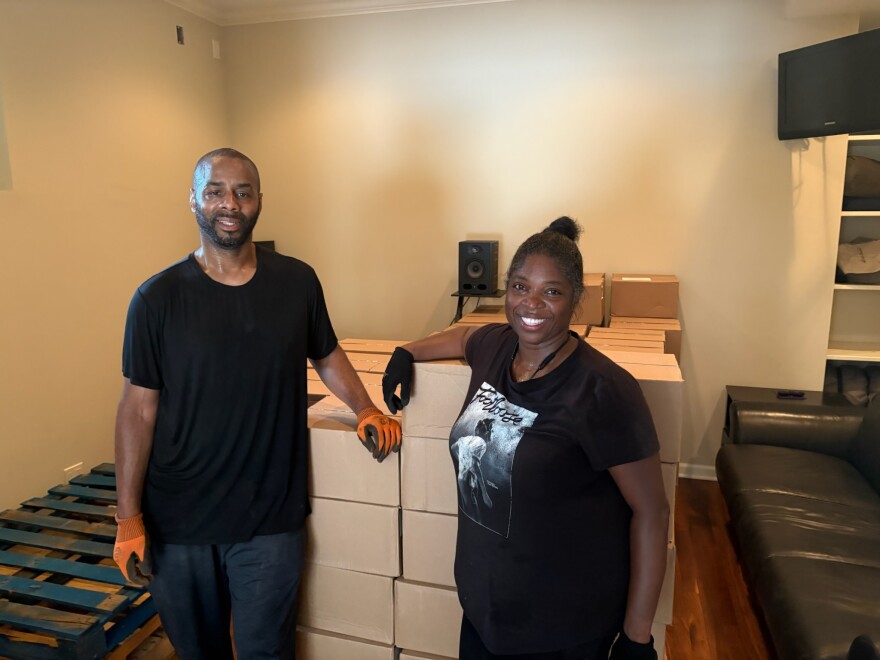Twenty years ago, Dion Walker was arrested in Fort Wayne on federal charges of possession of cocaine with intent to sell and given two life sentences. Despite a federal law that lessened his sentence, Walker then sat in a federal prison for 19 years.
In 2005, Walker was caught in possession of cocaine during an attempt to sell. He was indicted and pled guilty, receiving two life sentences in federal prison.
“I had one of those charges reduced in 2019 due to the First Step Act, but the First Step Act didn’t go far enough to reduce my second life sentence, so I had remained in prison six more years after that,” Walker said.
The First Step Act was passed into law in 2019, earning support from both Democrats and Republicans.
It was heralded as a historic criminal justice reform bill. It was intended to cut unnecessarily long federal sentences and improve conditions inside federal prisons and equalize the sentencing difference between powder and crack cocaine, as our understanding of the drug has changed.
Walker’s case shows the nearly 100-to-1 disparity; for the equivalent of four sheets of printer paper of crack he received the same sentence as for the equivalent of a bowling bowl amount of power cocaine.
The FSA reduced the life sentence he was given for the crack cocaine, but it didn’t affect the powder sentence.
“So, when the First Step Act became law and retroactive, it only touched my crack cocaine part and not the powder cocaine part,” Walker said.
He spent another six years in federal prison with no expectation of getting out. He petitioned for compassionate release, but was denied, until earlier this year when President Joe Biden granted him clemency before leaving office.
Erica Zunkel is a clinical professor of law at the University of Chicago law school and directs the criminal and juvenile justice clinic. She worked on Walker’s case while trying to get compassionate release.

She said one of the most compelling aspects of his case is that he received a mandatory life sentence for a drug offense that someone could not receive today.
“The way that the law applied in his case was just incredibly draconian. He didn’t commit any violence, he didn’t kill anybody,” Zunkel said. “So, I think his sentence is just a relic of the War on Drugs, these really harsh mandatory minimum sentences that were passed by Congress in the 80s and that have taken decades to unwind.”
The War on Drugs was a government-mandated operation from President Richard Nixon that began in the 1970s in an attempt to curb drug use in the U.S. In the 80s, President Ronald Reagan expanded many of Nixon’s anti-drug policies. In 2021, The Leadership Conference on Civil and Human Rights published an article saying the operation “completely failed” in its stated objectives.
Our understanding of addiction and substance abuse has changed in the 50 years since the War on Drugs began. A study from Columbia University in 2010 found that while 65% of inmates in the country suffer from addiction, only 11% receive treatment.
Bob Springer is a Peer Recovery Support Specialist with Allendale Behavioral Health. Like Walker, he spent several years in prison while in active addiction and says prisons aren’t currently equipped for rehabilitation.
“‘’Cause it’s easy to say he’s a drug addict, put him in prison,” Springer said. “He was selling drugs, put him in prison, we’ll get rid of the problem. No, we’re not. We’re not getting rid of the problem. You’re getting rid of a person.”
Getting relief in sentencing is more common in state court than the federal system, which makes Walker’s case one-in-a-million.
“So, for him to get clemency like that, that just doesn’t happen all the time,” Springer said. “And, I mean, I like that. That’s good for him, because now he has a chance to get back into society.”
Springer advocates for prisons to do more to help incarcerated people prepare to leave, rather than imposing harsh minimums. He said he believes more prisons should be teaching trades and life skills, as well as offering inmates the option to move away from the areas where they got in trouble rather than having to remain there under parole.
“When people mess up at their lowest point in life and they go to prison, and it’s over a drug-related charge, alcohol, I feel like that person should be given a chance,” he said. “But also, with options while he’s incarcerated.”
Zunkel said another important part of Walker’s case is all of the strides he made while in prison to become a better person and get clean. He had an incredible record for staying out of trouble, strengthening relationships with his friends and family and taking on work.

“He thought ‘I may never get out of prison, I probably will never get out of prison, I’m going to die in prison and yet I’m not gonna let that prevent me from doing the best that I can to make the best of a really challenging situation,” Zunkel said.
Walker filed multiple requests for compassionate release, outlining all his good behavior as well as some medical issues he was dealing with in prison. Despite the judge presiding over his case agreeing that he showed “great” reasons for release, they weren’t “extraordinary or compelling” under the law.
He’s also Black and the politics of the War on Drugs didn’t favor him in the early 2000s. In 2016, an old interview was published in Harper’s Magazine with one of Nixon’s top advisors saying the operation was aimed at the former President’s two enemies: “the anti-war left and Black people.”
“Crime, politics, drugs, I mean these have all been very fraught issues with clear racial implications and I think that’s always an undertone when people talk about crime and fear of release. Like, what are they really saying?” Zunkel said.
Walker is out of prison, now, and back with his fiancée, Virginia, and working. He’s settling back into life, but he’s also refusing to do so quietly. He feels a duty to talk about his experience and how the system could better serve people like him.
“Because I was one of the blessed ones to receive a commutation and I left people behind in my exact same situation, that wasn’t as fortunate, still sitting there with life sentences,” Walker said. “If the President don’t step in for them, they don’t stand a chance.”
Walker hopes to see more retroactivity in the law soon. But Zunkel said it’s hard to say where the country is headed in terms of the response to harsh drug laws. Every time there’s forward momentum, it seems like there’s backlash, she said, and it’s easier to be punitive.
“Thinking and centering rehabilitation and a less harsh system, it takes work and it takes thinking about these things with nuance,” Zunkel said. “And I think that it’s easy to make people scared about crime in ways that set us back.”
She said that’s why stories like Walker’s, of people who have been through the system, made strides toward rehabilitation and have no intention of ever getting in trouble again, are so important for people to hear.
Read the documents outlining Walker's criminal case from indictment to release:


